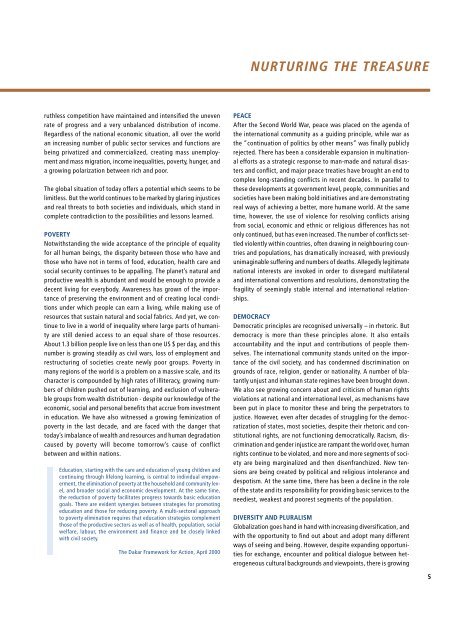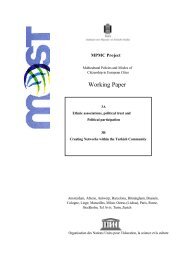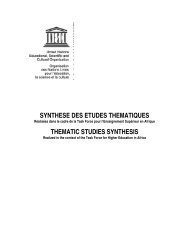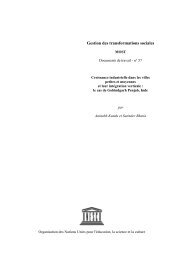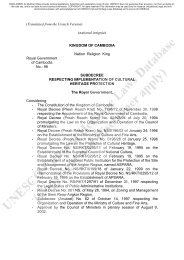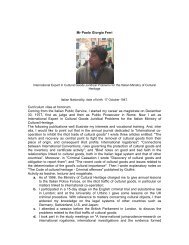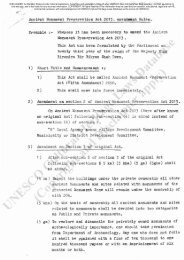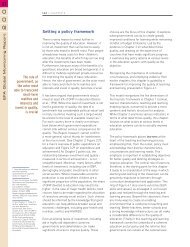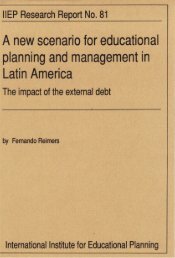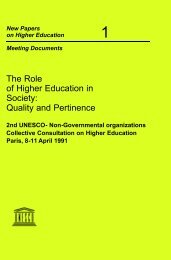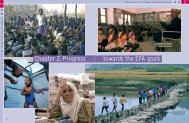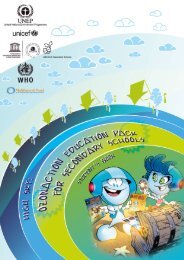NURTURING THE TREASURE NURTURING THE ... - Unesco
NURTURING THE TREASURE NURTURING THE ... - Unesco
NURTURING THE TREASURE NURTURING THE ... - Unesco
You also want an ePaper? Increase the reach of your titles
YUMPU automatically turns print PDFs into web optimized ePapers that Google loves.
<strong>NURTURING</strong> <strong>THE</strong> <strong>TREASURE</strong><br />
ruthless competition have maintained and intensified the uneven<br />
rate of progress and a very unbalanced distribution of income.<br />
Regardless of the national economic situation, all over the world<br />
an increasing number of public sector services and functions are<br />
being privatized and commercialized, creating mass unemployment<br />
and mass migration, income inequalities, poverty, hunger, and<br />
a growing polarization between rich and poor.<br />
The global situation of today offers a potential which seems to be<br />
limitless. But the world continues to be marked by glaring injustices<br />
and real threats to both societies and individuals, which stand in<br />
complete contradiction to the possibilities and lessons learned.<br />
POVERTY<br />
Notwithstanding the wide acceptance of the principle of equality<br />
for all human beings, the disparity between those who have and<br />
those who have not in terms of food, education, health care and<br />
social security continues to be appalling. The planet’s natural and<br />
productive wealth is abundant and would be enough to provide a<br />
decent living for everybody. Awareness has grown of the importance<br />
of preserving the environment and of creating local conditions<br />
under which people can earn a living, while making use of<br />
resources that sustain natural and social fabrics. And yet, we continue<br />
to live in a world of inequality where large parts of humanity<br />
are still denied access to an equal share of those resources.<br />
About 1.3 billion people live on less than one US $ per day, and this<br />
number is growing steadily as civil wars, loss of employment and<br />
restructuring of societies create newly poor groups. Poverty in<br />
many regions of the world is a problem on a massive scale, and its<br />
character is compounded by high rates of illiteracy, growing numbers<br />
of children pushed out of learning, and exclusion of vulnerable<br />
groups from wealth distribution - despite our knowledge of the<br />
economic, social and personal benefits that accrue from investment<br />
in education. We have also witnessed a growing feminization of<br />
poverty in the last decade, and are faced with the danger that<br />
today’s imbalance of wealth and resources and human degradation<br />
caused by poverty will become tomorrow’s cause of conflict<br />
between and within nations.<br />
Education, starting with the care and education of young children and<br />
continuing through lifelong learning, is central to individual empowerment,<br />
the elimination of poverty at the household and community level,<br />
and broader social and economic development. At the same time,<br />
the reduction of poverty facilitates progress towards basic education<br />
goals. There are evident synergies between strategies for promoting<br />
education and those for reducing poverty. A multi-sectoral approach<br />
to poverty elimination requires that education strategies complement<br />
those of the productive sectors as well as of health, population, social<br />
welfare, labour, the environment and finance and be closely linked<br />
with civil society.<br />
The Dakar Framework for Action, April 2000<br />
PEACE<br />
After the Second World War, peace was placed on the agenda of<br />
the international community as a guiding principle, while war as<br />
the ”continuation of politics by other means” was finally publicly<br />
rejected. There has been a considerable expansion in multinational<br />
efforts as a strategic response to man-made and natural disasters<br />
and conflict, and major peace treaties have brought an end to<br />
complex long-standing conflicts in recent decades. In parallel to<br />
these developments at government level, people, communities and<br />
societies have been making bold initiatives and are demonstrating<br />
real ways of achieving a better, more humane world. At the same<br />
time, however, the use of violence for resolving conflicts arising<br />
from social, economic and ethnic or religious differences has not<br />
only continued, but has even increased. The number of conflicts settled<br />
violently within countries, often drawing in neighbouring countries<br />
and populations, has dramatically increased, with previously<br />
unimaginable suffering and numbers of deaths. Allegedly legitimate<br />
national interests are invoked in order to disregard multilateral<br />
and international conventions and resolutions, demonstrating the<br />
fragility of seemingly stable internal and international relationships.<br />
DEMOCRACY<br />
Democratic principles are recognised universally – in rhetoric. But<br />
democracy is more than these principles alone. It also entails<br />
accountability and the input and contributions of people themselves.<br />
The international community stands united on the importance<br />
of the civil society, and has condemned discrimination on<br />
grounds of race, religion, gender or nationality. A number of blatantly<br />
unjust and inhuman state regimes have been brought down.<br />
We also see growing concern about and criticism of human rights<br />
violations at national and international level, as mechanisms have<br />
been put in place to monitor these and bring the perpetrators to<br />
justice. However, even after decades of struggling for the democratization<br />
of states, most societies, despite their rhetoric and constitutional<br />
rights, are not functioning democratically. Racism, discrimination<br />
and gender injustice are rampant the world over, human<br />
rights continue to be violated, and more and more segments of society<br />
are being marginalized and then disenfranchized. New tensions<br />
are being created by political and religious intolerance and<br />
despotism. At the same time, there has been a decline in the role<br />
of the state and its responsibility for providing basic services to the<br />
neediest, weakest and poorest segments of the population.<br />
DIVERSITY AND PLURALISM<br />
Globalization goes hand in hand with increasing diversification, and<br />
with the opportunity to find out about and adopt many different<br />
ways of seeing and being. However, despite expanding opportunities<br />
for exchange, encounter and political dialogue between heterogeneous<br />
cultural backgrounds and viewpoints, there is growing<br />
5


